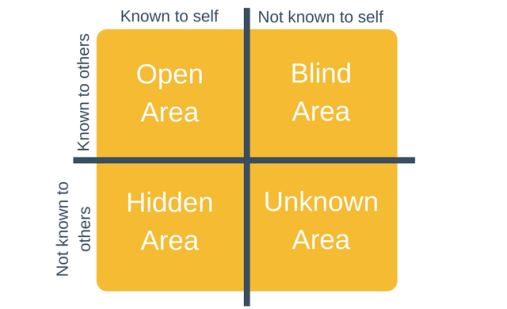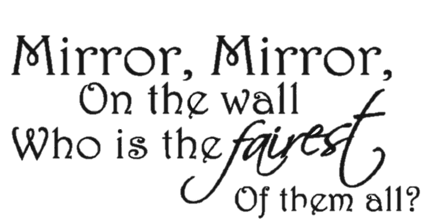
The open window pane of the Johari Window refers to information that is readily available to you and others. The goal of healthy relationships is to maximize the so-called ‘public area’, where both you and others know and understand who you are.
The blind window pane refers to information that is not known to you but is known to others. The ‘blind area’ describes areas of self-deception, like the rude person who thinks he is motivated by a desire for authenticity.
The hidden window pane refers to information that is known to you but is not known to others. The ‘secret area’ contains traits you know about yourself, but you are unwilling or unable to share with others. In the earlier example of the person who received a gift, gratitude was in the secret area since the recipient could not express it.
The unknown window pane refers to information that is not known to your or to others. The ‘unconscious’ area represents the part of the self that people may examine when they try to ‘find themselves’.
Open/Public Self
This pane represents free and open exchange of information between you and others; public behaviour available to everyone. The pane increases in size as the level of trust increases between you and others as more information – particularly personally-relevant information – is shared. It is personally-relevant information that each party finds useful.
The window has two-way glass. There is open exchange of facts, feelings and opinions between two people communicating through this pane. If you are in your Open Self, but the glass is one-way, then the other person's facts, opinions, and feelings are obscured. You become confused about the mutuality of the relationship. Your peer does not present himself openly. We can thus see a person/manager with a capacity for open relationships becoming an interviewer who does not reveal all.
Capacity for Open Relationships

Private Self
For some reason, you keep your information hidden. The fear is risking too much, with exposure to influences/demands and uncertainty. One reason for the facade could be that you do not feel supported at home or in your work situation – perhaps you want to protect yourself from being criticized.
HOWEVER, unless these assumptions are tested, and you dip a toe in the water, learning about what is real is blocked. Your thoughts may be a fantasy. On the other hand, you may keep certain kinds of information secret to support and protect others.
Your reasons may be:
- Selfish – you wish to control the situation and non-disclosure could be tactically helpful.
- However, your intentions could be selfless if you believe that tactful non-disclosure and private thoughts may be helpful.
Tact, diplomacy or even smouldering resentment may feature with the private self. Keeping your views to yourself with no hint of how you feel about the other party can be useful behaviour.
‘Privacy’ may protect you and others. The private self is controlled. Uncontrolled leaks may be untimely or hurtful. It may be irrelevant to reveal content from the private self even in a trusting relationship. However, if there is leakage (perhaps you decide to open up), relationships may be damaged because your partner(s) may question your motives for holding back in the first place. Life is not fair, is it?

If you decide to come clean and disclose, then you may argue that this move into the Open Arena is an expression of trust. However, you must ask whether the other person is ready and able to receive such feedback - if not the resultant upset, conflict, etc., need to be managed.
Leakage through the blind-self may be communicated non-verbally. Your manner, forehead, or tone of voice may reveal the content of your message. You may blurt it out wrongly, awkwardly or recklessly only to then try and retract by saying, "Oh, I didn't mean it", or "I don't mean it that way, sorry!" Damage limitation is now needed – you are naked.
Blind Self
As you work with others, you communicate all kinds of information of which you are unaware, but others pick up. How? By verbal cues, mannerisms, the way you say things or the style in which you relate to others. The extent to which you are insensitive to much of your own behaviour and what it may communicate to others, can be surprising and disconcerting.
Bull in a China Shop

The blind spot is very important in terms of personal development. Many of us know and realize that others find things we do/say difficult or puzzling (more or less).
These may be our eccentricities. They can be bull-in-a-china shop behaviours which others find hard to react to and are hurt or irritated/agitated by. Precisely what aggravates will depend upon their overall attitude towards you and their capacity for accommodating your behaviour (their tolerance and flexibility).
If they feel some affection for you, their threshold of tolerance will be high. If they have no affection, they distance themselves. Your blind spot behaviours may be irritants. You rub them up the wrong way. In a working relationship low affection/esteem for the other and blind spot behaviours are recipes for interpersonal conflict.
‘Blind spotting’ demands considerable self-awareness and self-control. When you look in the mirror you see yourself as you like-to-see-yourself. You may not like certain personal traits but many in this situation are just not able to address these areas and change themselves.

Such personal learning (unravelling) involves the difficulties of building new, consistent repertoires of behaviour.
AWARENESS is needed in the first place about the blind spot behaviours.
There must be a desire and WILLINGNESS to do something about it.
You then must take ACTION – do it and keep it up over time without lapsing.
The funny thing about people is their extravagance – this is why we are so interesting, loveable and unpredictable. Without variations (and often extremes) in character just think what a bland, boring world it would be.
Nevertheless, in many life situations, others must be able to accommodate your behaviour, and if bulls-in-china-shops are frantic, they can do considerable damage.
Unknown Self
What affects you and others may be below the surface of awareness to both parties. Early childhood experiences may give rise to aversions learned through experience. You may have unrecognized resources and traits. Learning opportunities and exchange of feedback in a supportive setting may allow for these influences to surface and be opened – but only if you want to!
Mystery in The Cupboard

These people are a mystery to each other. There may be suspicion merely because of a lack of information. "I do not know why I am suspicious of you or why I am attracted to you. I do not even realize that I am attracted ... but I am."
It is in this area that we often find the most opportunity for growth! Once we are willing to open up to others (grow the private self) and to be open to other’s feedback (growth in the blind self) we will find that we have, as a result, ‘opened up’ the unknown self as well.